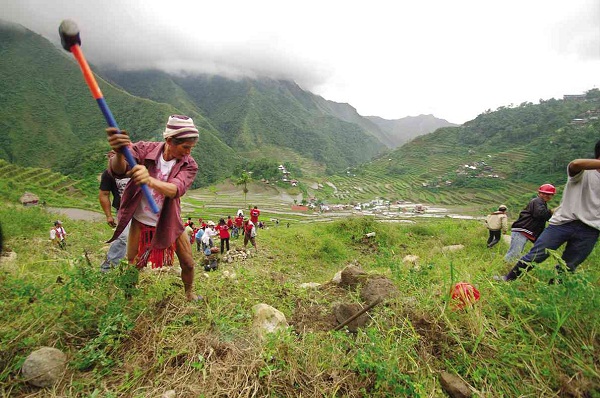
THE ENGINEERING and environmental science devised by ancient Ifugaos to carve out the rice terraces is evidenced by their sustainability. Some of the terraces were eroded last year by a storm, but Ifugao folk and volunteers have rebuilt them. RICHARD BALONGLONG/INQUIRER NORTHERN LUZON
A solution to the looming water shortage appears to have already been available several decades ago, right before our eyes.
International researchers have proposed to replicate the muyong, a communal forest or woodlot in the highlands of Ifugao, as a strategy for sustainable water conservation. A watershed as big as five hectares, the muyong serves as the hydrological system that irrigates the Ifugao rice terraces and supplies potable water to lowland communities.
Evolutionary anthropologist Scott Platt Salcedo and Korean researcher Jae Woo Jang presented a study on adopting the muyong system in other parts of the Philippines during the yearly convention of the National Association of Unesco (United Nations Educational, Scientific and Cultural Organization) Clubs in the Philippines.
Not mainstream
The conference on “Water Education: Developing Solutions for Sustainable Future” was held in Calamba City in Laguna on Jan. 26-29. Some 200 students, teachers and college deans, including delegates from Brunei, South Korea, Japan, Malaysia, Indonesia and Singapore, attended.
“The muyong system has been written about a lot, with studies done as far back as the 1980s, within the circles of anthropological research. The problem (however) is that these findings were not made mainstream,” Salcedo said.
In a 10-page paper written after an ethnographic research in the Ifugao last year, Salcedo and Jang looked at the viability of adopting the system in other upland areas to sustain the supply of purified water, for instance, in Metro Manila.
Salcedo and Jang are also the founders of “The Mind Movers,” a Unesco project aimed at promoting applied science among students.
Reduce runoffs, erosion
The muyong system, recognized worldwide as an ideal forest management strategy, basically works this way: Water from the rainforest cascades down the terrace ponds, which like staircases are carved with strong ridges that act as a “built-in water purifying or filter system” and help reduce runoffs and erosion.
From the terrace ponds, a water conveyance network made from indigenous materials brings water downstream to the fields. The fields are layered with pebbles and stones, matching the water volume and velocity, to further purify the water for household consumption.
Salcedo said the muyong could be tested in other mountain ridges, for instance, in the Mt. Makiling rainforest, but the process could be more intricate given other factors, such as the endemic flora and fauna of the Cordilleran forests.
Advanced
Another consideration, he said, is the sociopolitical structure in Ifugao communities, such as their deep veneration for nature.
“I am not a Filipino, but your ancestors are far more advanced than Western technology,” Jang said.
Salcedo and Jang said Philippine policymakers should come up with legislation that would ensure watershed management while owners of vast upland properties could donate lands for communal use, as how it was done in Ifugao.
Although an indigenous irrigation system, the muyong is considered as a technological “innovation” since it is proven to be environmentally efficient, sustainable and time-tested, they added.